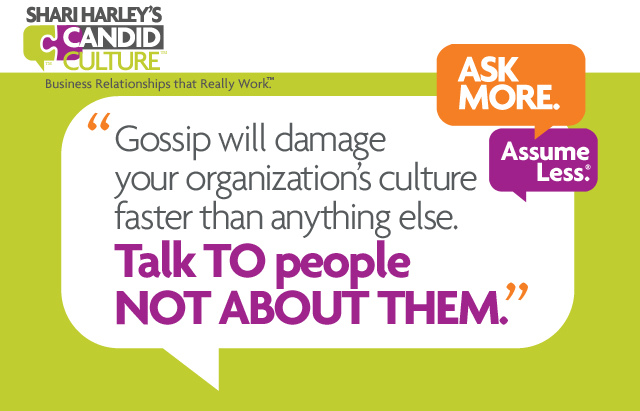Posts Tagged ‘gossip’
I had a colleague at my last job, before I started Candid Culture, who was a peer and a friend. We were at a similar level and would periodically sit in one of our offices, with the door closed, talking about the bad decisions our company’s senior leaders made. One day I realized that these conversations were exhausting to me. They were negative and didn’t make me feel better. In fact, they made me feel worse.
Some people assert that venting is cathartic and makes people feel better. It doesn’t.
I’ll use an analogy I read in one of Deepak Chopra’s books. When you put a plant in the closet and don’t give it light or water, it withers and dies. When you put a plant in the sunlight and water it, it grows. And the same is true for people. What you give attention to gets bigger. What you deprive attention goes away.

Your life is made up of the people you spend time with and what you talk about. What are you talking about?
If you’re complaining, unless you’re planning a conversation to address a challenge or problem, you’re venting. And talking about what frustrates you will only make you more frustrated.
My advice: Do something about the things you can impact and let the other stuff go.

People have a tendency to talk about us, not to us. If you haven’t been gossiped about, you just need to meet more people.
If you have something to say, say it directly to the person involved. If you’re not going to speak to the person directly, say nothing at all. As we all know, this is easier said than done. Gossip will destroy relationships, organizational cultures, and careers faster than anything else. And we are all tempted to gossip.
Most of us consider gossip to be saying something bad about someone else when that person isn’t there. But what if we say something good?
The strictest definition of gossip is talking about another person while she is not present. But for our purposes, let’s say gossip is talking about another person so as to alter how others think about that person.
Several years ago, I took a year-long class with about eighty other people. The class met one weekend a quarter over twelve months and had a few ground rules, one of which was no gossip. Participants couldn’t gossip anywhere, at any time, during the class’s entire duration. No gossip with friends, family, or coworkers for a year.
When the class started, I assumed the no-gossip guideline would be no problem for me. Then I started to notice my behavior. At the time, I was a director in my organization and had one friend at work who was my typical confidant. Most of us have “our person” at work—someone we confide in and complain to. The two of us would sit in my office with the door closed, talking about all the bad decisions the leaders of our company had made. The moment I began paying attention to the no-gossiping rule, I realized that not only did I gossip, but I was good at it and even enjoyed it. (Oh, come on, admit it—it’s fun.)
The problem is that gossiping breaks trust. If a coworker gossips with you about someone else, he will talk about you to someone else. You are not special or different. (Well, you are, but you know what I mean.) You are not exempt.

As you rise in an organization, you have exposure to more and more sensitive information. You know about employees’ performance ratings, the organization’s financial results, and impending layoffs. One criterion of promotion is being able to be trusted with sensitive information. If the senior people in your organization think you’re a gossip and can’t be trusted to keep confidences, your career is going nowhere.
People will never stop gossiping. It’s one of those human things. We all do it, and we aren’t going to quit. The best we can hope for is to reduce the amount of time we spend talking about other people behind their backs.
I won’t suggest you stop gossiping. I merely suggest you bring attention to the gossip circulating throughout your organization. Bringing attention to the gossip circulating in your organization will raise awareness, and reduce the gossip, just a little bit.
** This blog is an excerpt from the book How to Say Anything to Anyone.

I had a colleague at my last job, prior to starting Candid Culture, who was a peer and a friend. We were at a similar level and would periodically sit in one of our offices, with the door closed, engaging in office gossip, talking about the bad decisions our company’s senior leaders made. One day I realized that these conversations were exhausting to me. They were negative and didn’t make me feel better. In fact, they made me feel worse.
Some people distinguish between office gossip and venting, asserting that venting is cathartic and makes people feel better. It doesn’t. Venting and office gossip are one in the same and both will make you tired and feel worse about your job and organization.
I’ll use an analogy I read in one of Deepak Chopra’s books. When you put a plant in the closet and don’t give it light or water, it withers and dies. When you put a plant in the sunlight and water it, it grows. And the same is true for people. Wherever you put your attention will get bigger and stronger. Whatever you deprive attention will become smaller.
In addition to draining you of energy and ensuring you focus on the things that frustrate you, office gossip kills organizations’ cultures. If employees can’t trust that their peers won’t talk about them when they’re not there, there is no trust in the organization. And this lack of trust feels terrible. It makes employees nervous and paranoid. A lack of trust sucks the enjoyment out of working because we feel we have to continuously watch our back.
Office gossip isn’t going anywhere. It’s a human phenomenon and is here to stay. But you can reduce office gossip.
Here are five steps to reduce the office gossip in your workplace:
Reducing gossip in the workplace step one: Address the gossip head on.
Tell your employees, “I’ve been hearing a lot of gossip, which is not good for our culture.”
Reducing gossip in the workplace step two: Hold regular town hall meetings, and give employees more information than you think you need to about initiatives, organizational changes, profitability, etc. Employees want to know how the organization is doing and what they can do to contribute. In the absence of knowledge, people make stuff up, not because they’re malicious, but because they have a need to know. Employees don’t have to fill in the gaps with office gossip when you inform them.
Reducing gossip in the workplace step three: Create a no-gossip-in-the-workplace policy.
Tell your employees, “We want people talking directly to each other, rather than about each other. As a result, we’re putting a no-gossip policy in place.”
Reducing gossip in the workplace step four: Draw attention to gossip.
Perhaps suggest, “Every time you hear gossip, wave two fingers in the air (or something else that’s equally visual).” This will draw attention to office gossip without calling anyone out.
Also, ask your peers and friends not to gossip with you. End conversations that contain gossip. This will be hard to do, but if everyone does it, it will become much easier.”
Reducing gossip in the workplace step five: Have an agreed-upon consequence for gossip.
Tell employees, “Every time we hear gossip in the workplace, the gossiper owes a dollar. Every quarter the gossipers will buy the office lunch from the office gossip jar.”
The keys to reducing office gossip are to draw attention to the gossip, have a consequence for gossiping, and over communicate so your employees don’t have to fill in the gaps themselves.
Venting and office gossip are the same. If you’re talking about someone else, unless you’re planning a conversation with a coworker or friend to address a challenge or problem, you’re gossiping. And talking about what frustrates you will only make you more frustrated.
My advice: Do something about the things you can impact and let the other stuff go. Talk about the things that matter to you. Resist the temptation to speak negatively about the people around you. And know that anyone who will gossip about someone to you, will also gossip about you.

People are busy and stressed. Reading the news is stressful. Sitting in traffic is stressful. Feeling we need to check our phones at all hours of the day and night is stressful. It’s easy to make someone’s day at work better. Why not do it? 
I’m going to suggest being nice to people at work. And I’ll give you my definition of nice. In my world, nice isn’t about asking about someone’s weekend, how their kids are doing, or what they’re doing with their summer. I won’t tell you not to talk about these things at work, but they aren’t required to be nice. In fact, those conversations can be distracting and keep people at work longer than they want and have to be there, which is anything but nice.
Here are six ways to create a nice company culture:
Nice company culture tip number one: Look people in the eye as you pass them in the hallway, both people you know and don’t know, and say hello. I’ve always found it odd that someone can pass me on a sidewalk or in a hallway and pretend I’m not there. It’s weird. Say hi to the people you walk by.
Nice company culture tip number two: Don’t send emails cc’ing people who don’t need to know. This damages relationships, annoys people, and fills people’s inboxes with unnecessary emails.
Nice company culture tip number three: Take the high road. It’s easy to fall on principle or insist on doing something a certain way when the other person is frustrating or otherwise difficult to work with. Resist the temptation to be right and instead, do what works.
Nice company culture tip number four: When you disagree, pick up the phone rather than having a text or email debate. You can often resolve issues more quickly and manage communication better verbally than in writing.
Nice company culture tip number five: Do the things you said you would. Be on time, meet deadlines, and keep your agreements. If you can’t keep an agreement, make it known as soon as you know.
Nice company culture tip number six: Don’t gossip. Definition of gossip: Talking about anyone who isn’t physically present. Gossip creates environments of negativity and distrust. Think it and then let it go.
You have more control over your workplace atmosphere and your day than you may think you do. Be nice. Just because.
People are tired, busy, and stressed. Be nice to people. Just because. It will make your day, their day, and your work environment better.
Join the Candid Culture Community:





I had a colleague at my last job, prior to starting Candid Culture, who was a peer and a friend. We were at a similar level and would periodically sit in one of our offices, with the door closed, engaging in office gossip, talking about the bad decisions our company’s senior leaders made. One day I realized that these conversations were exhausting to me. They were negative and didn’t make me feel better. In fact, they made me feel worse.
Some people distinguish between office gossip and venting, asserting that venting is cathartic and makes people feel better. It doesn’t. Venting and office gossip are one in the same and both will make you tired and feel worse about your job and organization.
I’ll use an analogy I read in one of Deepak Chopra’s books. When you put a plant in the closet and don’t give it light or water, it withers and dies. When you put a plant in the sunlight and water it, it grows. And the same is true for people. Wherever you put your attention will get bigger and stronger. Whatever you deprive attention will become smaller.
In addition to draining you of energy and ensuring you focus on the things that frustrate you, office gossip kills organizations’ cultures. If employees can’t trust that their peers won’t talk about them when they’re not there, there is no trust in the organization. And this lack of trust feels terrible. It makes employees nervous and paranoid. A lack of trust sucks the enjoyment out of working because we feel we have to continuously watch our back.
Office gossip isn’t going anywhere. It’s a human phenomenon and is here to stay. But you can reduce office gossip.
Here are five steps to reduce the office gossip in your workplace:
Reducing gossip in the workplace step one: Address the gossip head on.
Tell your employees, “I’ve been hearing a lot of gossip, which is not good for our culture.”
Reducing gossip in the workplace step two: Hold regular town hall meetings, and give employees more information than you think you need to about initiatives, organizational changes, profitability, etc. Employees want to know how the organization is doing and what they can do to contribute. In the absence of knowledge, people make stuff up, not because they’re malicious, but because they have a need to know. Employees don’t have to fill in the gaps with office gossip when you inform them.
Reducing gossip in the workplace step three: Create a no-gossip-in-the-workplace policy.
Tell your employees, “We want people talking directly to each other, rather than about each other. As a result, we’re putting a no-gossip policy in place.”
Reducing gossip in the workplace step four: Draw attention to gossip.
Perhaps suggest, “Every time you hear gossip, wave two fingers in the air (or something else that’s equally visual).” This will draw attention to office gossip without calling anyone out.
Also, ask your peers and friends not to gossip with you. End conversations that contain gossip. This will be hard to do, but if everyone does it, it will become much easier.”
Reducing gossip in the workplace step five: Have an agreed-upon consequence for gossip.
Tell employees, “Every time we hear gossip in the workplace, the gossiper owes a dollar. Every quarter the gossipers will buy the office lunch from the office gossip jar.”
The keys to reducing office gossip are to draw attention to the gossip, have a consequence for gossiping, and over communicate so your employees don’t have to fill in the gaps themselves.
Venting and office gossip are the same. If you’re talking about someone else, unless you’re planning a conversation with a coworker or friend to address a challenge or problem, you’re gossiping. And talking about what frustrates you will only make you more frustrated.
My advice: Do something about the things you can impact and let the other stuff go. Talk about the things that matter to you. Resist the temptation to speak negatively about the people around you. And know that anyone who will gossip about someone to you, will also gossip about you.

 It’s hard to come back to work after a long weekend, no matter how much you like your job. As fun and fulfilling as work can be, we all struggle with back to work blues from time to time.
It’s hard to come back to work after a long weekend, no matter how much you like your job. As fun and fulfilling as work can be, we all struggle with back to work blues from time to time.
If you’re having a hard time getting back into it today, here are a few things to try:
- Be realistic about how much you’re going to do today. Move a few things on today’s to-do list to tomorrow, or maybe Wednesday. Setting unrealistic goals sets people up for frustration and feelings of failure.
- Pick one or two things you’re going to do today, and finish those two things.
- Do one thing at a time. Not five.
Stress occurs when we’re thinking about the past or the future. When we’re in the moment, there is nothing to stress about. You’re focused on what you’re doing, nothing else. This is easier said than done, which is why I do yoga. If I’m thinking about anything but the teacher’s instructions, I fall over.
- Plan something fun. When is your next vacation? What are you looking forward to? Having something fun and exciting on the horizon is motivating and keeps us going.
- If you’re not having fun at work or you’re feeling stuck, tell someone who can do something about it. Most people are so afraid of being fired, they don’t speak up at work. From my experience it’s not so easy to get fired. Look around. I suspect there are several people you work with who you think deserve to be fired, yet there they are. Worry less. Speak up more. No organization is going to fire you for wanting and being willing and able to do more.
If after all of these BRILLIANT suggestions you still find yourself in the back to work blues, gossip about a few people who haven’t made it in yet today, eat someone else’s lunch from the refrigerator that looks better than what you brought, and re-arrange the most organized person’s desk. And all will be well.
Advance your career and manage people with our top three sellers.



 I had a colleague at my last job who was a peer and a friend. We were at a similar level and would periodically sit in one of our offices, with the door closed, talking about the bad decisions our company’s senior leaders made. One day I realized that these conversations were exhausting to me. They were negative and didn’t make me feel better. In fact, they made me feel worse.
I had a colleague at my last job who was a peer and a friend. We were at a similar level and would periodically sit in one of our offices, with the door closed, talking about the bad decisions our company’s senior leaders made. One day I realized that these conversations were exhausting to me. They were negative and didn’t make me feel better. In fact, they made me feel worse.
Some people distinguish between gossip and venting, asserting that venting is cathartic and makes people feel better. It doesn’t.
I’ll use an analogy I read in one of Deepak Chopra’s books. When you put a plant in the closet and don’t give it light or water, it withers and dies. When you put a plant in the sunlight and water it, it grows. And the same is true for people. Whatever you give attention will proliferate. Whatever you deprive attention will go away.
Your life is made up of the people you spend time with and what you talk about. What are you talking about?
In addition to draining you of energy and ensuring you focus on the things that frustrate you, gossip in the workplace kills the organization’s culture. If employees can’t trust that their peers won’t talk about them when they’re not there, there is no trust in the organization. And you can’t have real relationships without trust.
Gossip isn’t going anywhere. It’s a human phenomenon and is here to stay. But you can reduce gossip.
A few ways to reduce the gossip in the workplace:
- Address the gossip head on.
“I’ve been hearing a lot of gossip, which is not good for our culture.”
- Hold regular town hall meetings, and give employees information about initiatives, organizational changes, profitability, etc. Employees want to know how the company is really doing and what they can do to contribute.
- Create a no gossip in the workplace policy.
“We want people talking directly to each other, rather than about each other. As a result, we’re putting a no gossip policy in place.”
- Draw attention to gossip.
“Every time you hear gossip, wave two fingers in the air.” This will draw attention to the gossip in the workplace without calling anyone out.
Also, ask your peers and friends not to gossip with you. End conversations that contain gossip. This will be hard to do, but if everyone does it, it will become much easier.
- Have an agreed-upon consequence for gossip.
“Every time we hear gossip in the workplace, the gossiper owes a dollar. Every quarter the gossipers will buy the office lunch from the gossip jar.”
The keys to reducing gossip in your office are to draw attention to the gossip, have a consequence for gossiping, and over communicate so your employees don’t have to make stuff up. Employees want to know what’s happening in the organization. In the absence of knowledge, people make stuff up, and it’s never good.
Venting and gossip are the same. Unless you’re planning a conversation with a coworker or friend to address a challenge or problem, you’re gossiping. And talking about what frustrates you will only make you more frustrated.
My advice: Do something about the things you can impact and let the other stuff go. Talk about the things that matter to you. Resist the temptation to speak negatively about the people around you. And know that anyone who will gossip about someone to you, will also gossip about you.

Even after working in the corporate arena for 18 years, I am amazed at how much people talk about other people. I’m a little embarrassed that gossip in the workplace still catches me off guard. I used to live in New York City. How can I be this naïve?
Last week I talked with a friend I used to work with. She still works for the company where we worked together. She told me that Michael, one of our old coworkers, was job hunting. “How do you know that?” I asked. She said Bob the IT manager had told her, and Lisa the marketing director had told Bob. Lisa is friends with Michael. Michael must have confided in Lisa, who told Bob, who told my friend, who told me. I have, by the way, changed everyone’s names, so as not to tell the rest of the world that Michael is job hunting. But in the event that you have an open job that would be a good fit for Michael, perhaps I should put his real name and email address here.
Michael trusts Lisa. But Lisa clearly isn’t trustworthy. I’m sure she thinks she is, but clearly, she can’t keep information to herself. Lisa trusts Bob to keep a secret, but clearly Bob can’t and neither can my friend.
So what does this say? Everyone is a liar and no one keeps confidences? No, I’m actually saying neither of these things.
I really believe that people think they keep a confidence when they share information like this. We rationalize telling ourselves, “I only told one person, and Bob won’t say anything. I trust him. And Michael wouldn’t mind if I told Bob. They’re friends. And even if he did mind, Bob needs to know because if Michael leaves it will impact IT.” And so it goes.
I’m not telling you this to make you paranoid. I’m saying it to make you careful.
I have started to assume that whatever I tell someone will be told to someone else. And it makes me more careful about what I say and write, especially what I write. Don’t put anything in an email you wouldn’t be comfortable being forwarded to someone else.
You may be wondering how this is possible. There is no one who keeps a confidence? How can you run a business like that? Anything I tell someone will be told to someone else? Not if you’re talking to an outside consultant, a business coach, your attorney or accountant, but inside your organization, yes. People have a tendency to share gossip in the workplace with their inner circle –the people in the organization they’re close to. So be careful. Watch what you say and to whom. And assume that whatever you tell someone may go elsewhere. Consider the upside –you can use your coworkers to share news that you don’t have time to broadcast yourself.














 It’s hard to come back to work after a long weekend, no matter how much you like your job. As fun and fulfilling as work can be, we all struggle with back to work blues from time to time.
It’s hard to come back to work after a long weekend, no matter how much you like your job. As fun and fulfilling as work can be, we all struggle with back to work blues from time to time.




